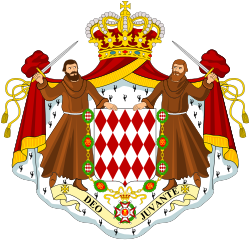 |
|---|
General election were held in Monaco on 18 April 1926 to elect 12 members of the National Council. The national councilmen were elected by a 30-member Electoral College.
 |
|---|
General election were held in Monaco on 18 April 1926 to elect 12 members of the National Council. The national councilmen were elected by a 30-member Electoral College.
The 30-member Electoral College consisted of nine members elected by the Communal Council and 21 members elected by voters. It also had substitute members elected by the Communal Council and six substitute members elected by voters.
The Communal Council held an election for nine members and three substitute members of the Electoral College on 20 March 1926. [1]
An election of the remaining 21 Electoral College members and six substitute members was held on 21 March 1926. Only 20 candidates got a majority of votes to be elected in the first round.
| Candidates | Votes | |
|---|---|---|
| Members | Jean Bonafède | 489 |
| Joseph Bonafède | 480 | |
| Albert Pistonatto | 472 | |
| Jules Gastaud | 322 | |
| Charles Bernasconi | 311 | |
| Louis Néri | 310 | |
| Louis Blanchy | 304 | |
| Constant Auréglia | 303 | |
| Étienne Boéri | 301 | |
| Émile Barral | 301 | |
| Eugène Marquet Jr. | 301 | |
| Emmanuel Bœuf | 300 | |
| Henri Crovetto | 300 | |
| Louis Sangeorge | 298 | |
| Joseph Médecin | 297 | |
| Étienne Fautrier | 283 | |
| Victor Frolla | 281 | |
| Michel Porasso | 279 | |
| Eugène Projetti | 275 | |
| Albert Sategna | 274 | |
| Maurice Giordano | 269 | |
| Charles Vatrican | 240 | |
| Hermenégilde Vigliani | 233 | |
| Antoine Icardi | 217 | |
| Édouard Giordano | 209 | |
| Louis Settimo | 209 | |
| Second Armita | 208 | |
| Louis Notari | 206 | |
| Lazare Gastaud | 204 | |
| Henri Bergeaud | 203 | |
| Charles Mullot | 201 | |
| Jean Vatrican | 201 | |
| René Gastaud | 200 | |
| Joseph Raimbert | 200 | |
| Laurent Jioffredy | 199 | |
| Louis Bœuf | 197 | |
| François Picco | 192 | |
| Jules Baud | 189 | |
| Philippe Fontana | 182 | |
| Substitute members | Maurice Marchisio | 296 |
| François Crovetto | 295 | |
| Joseph Isoard | 294 | |
| Jules Bianchi | 292 | |
| Jean Campana | 292 | |
| Arthur Linetti | 286 | |
| Théodore Raimbert | 201 | |
| Achille Auréglia | 200 | |
| Auguste Médecin | 200 | |
| Henri Rapaire | 199 | |
| Charles Médecin | 196 | |
| Emile Barral | 194 | |
| Valid ballots | 541 | |
| Invalid ballots | 18 | |
| Total ballots | 559 | |
| Source: Journal de Monaco [1] | ||
An election of the remaining Electoral College member was held on 28 March 1926.
| Candidates | Votes | |
|---|---|---|
| Maurice Giordano | 217 | |
| Édouard Giordano | 2 | |
| Joseph Mullot | 2 | |
| Célestin Allavena | 1 | |
| Other | 1 | |
| Valid ballots | 220 | |
| Invalid ballots | 25 | |
| Total ballots | 245 | |
| Source: Journal de Monaco [1] | ||
The Electoral College voted on members of the National Council on 18 April 1926:
| Candidates | Votes | ||
|---|---|---|---|
| Auguste Settimo | 26 | ||
| Joseph Crovetto | 22 | ||
| Charles Bernasconi | 21 | ||
| Victor Bonafède | 21 | ||
| Michel Fontana | 21 | ||
| Eugène Marquet | 21 | ||
| Henri Marquet | 21 | ||
| Constant Aureglia | 18 | ||
| Félix Bonaventure | 17 | ||
| Henri Crovetto | 17 | ||
| Étienne Fautrier | 17 | ||
| Étienne Boeri | 16 | ||
| Orecchia | 7 | ||
| Dr. Marsan | 6 | ||
| Georges Rapaire | 3 | ||
| Sategna | 3 | ||
| Louis Aureglia | 2 | ||
| Joseph Médecin | 2 | ||
| Pierre Jioffredy | 1 | ||
| Notari | 1 | ||
| Charles Médecin | 1 | ||
| Paul Cioco | 1 | ||
| Dr. Simon | 1 | ||
| Source: Journal de Monaco [2] | |||